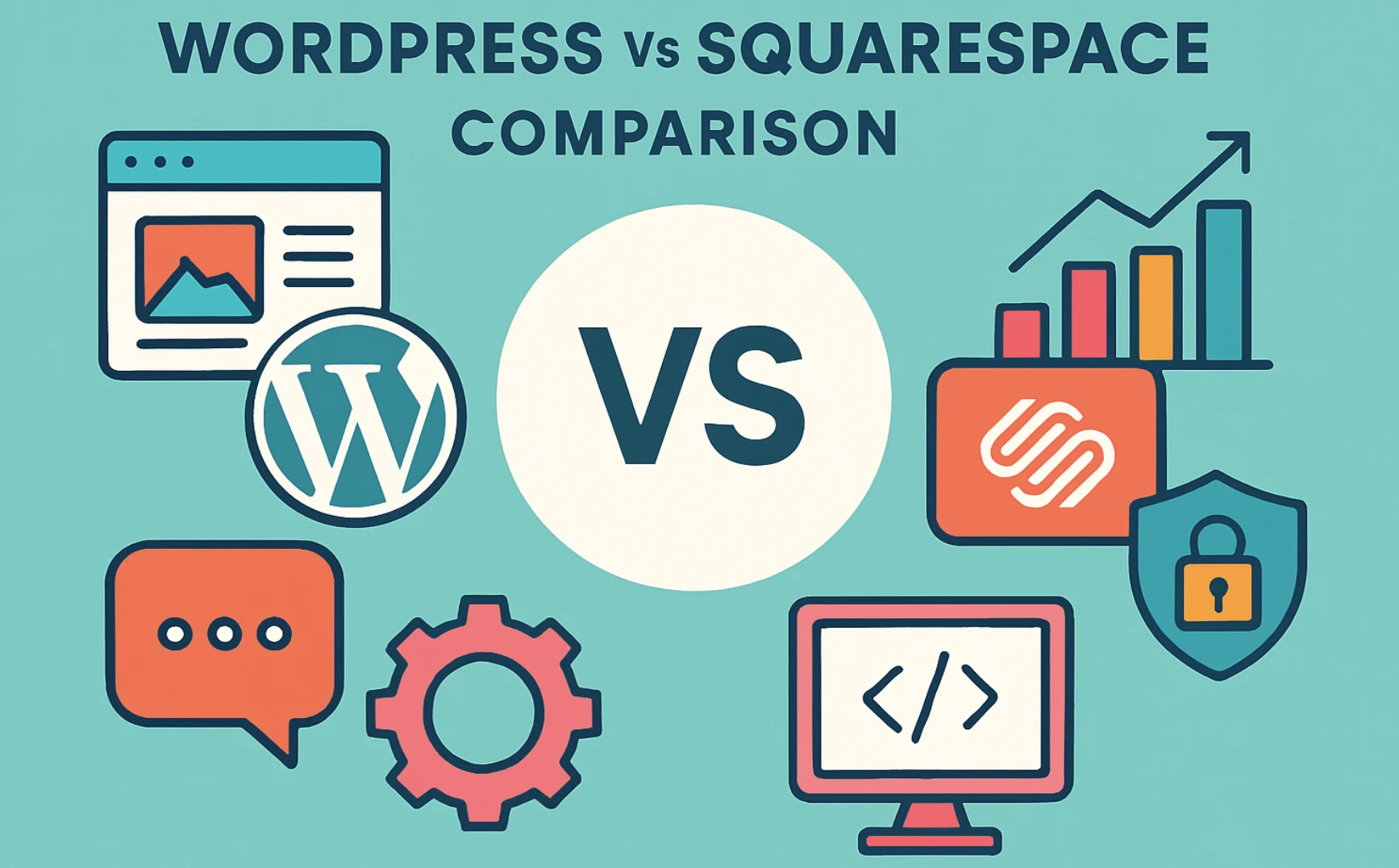
Choosing the right platform for your website can feel overwhelming, especially with so many options available. The choice between WordPress vs Squarespace often comes down to your goals and priorities. WordPress powers over 43.6% of all websites in 2025, making it the go-to choice for users who value flexibility and customization. On the other hand, Squarespace appeals to beginners and creative professionals who want a polished, hassle-free experience.
Your decision matters if you plan to set up a blogging site, an e-commerce store, or a portfolio. WordPress offers unmatched scalability, while Squarespace simplifies the process with its all-in-one website builder. If you’re looking for powerful SEO tools or an attractive design, this comparison will assist you in discovering the ideal website builder to suit your requirements.
Overview of WordPress and Squarespace
What is WordPress?
WordPress is the world’s most popular content management system (CMS), powering over 43.6% of websites in 2025. It’s an open-source platform that gives you complete control over your website. WordPress offers unmatched flexibility, whether you’re building a blog, an e-commerce store, or a portfolio. You can choose from thousands of themes and plugins to customize your site exactly how you want.
In 2025, WordPress continues to innovate. The Gutenberg block editor has evolved into a full-fledged site builder, making it easier to design without needing extra tools. It also focuses on performance with Core Web Vitals, ensuring faster loading speeds and better user experiences. Security remains a priority, with AI-driven tools for real-time threat detection.
WordPress is a top choice if you’re looking for a platform that grows with your needs.
|
Feature/Functionality |
Description |
|---|---|
|
Innovative design approaches |
Encourages unique visual concepts and user interaction through experimental designs. |
|
Allows you to design websites without separate tools, democratizing web design. |
|
|
Core Web Vitals focus |
Improves loading speed and user experience with advanced AI-driven predictive loading. |
|
Enhanced security measures |
Uses AI for real-time threat detection, ensuring a secure website environment. |
|
AI integration in content creation |
Offers tools for personalized content generation, boosting efficiency and engagement. |
What is Squarespace?
Squarespace is an all-in-one website builder designed for simplicity and style. It’s perfect for beginners or creative professionals who want a polished website without the hassle of coding. With its drag-and-drop interface, you can create a stunning site in minutes. Squarespace offers a variety of customizable templates tailored to different industries, from portfolios to online stores.
In 2025, Squarespace continues to shine with built-in ecommerce capabilities, advanced marketing tools, and AI-powered design features. Its user-friendly design ensures you can focus on your content while the platform handles updates and security.
Squarespace is an excellent choice if you value ease of use and aesthetic appeal.
-
Key features of Squarespace in 2025:
-
Drag-and-drop website builder
-
Variety of customizable templates
-
Comprehensive e-commerce support
-
Advanced marketing tools
-
AI-powered design and content generation
-
User-friendly content management system (CMS)
-
Key Differences Between WordPress and Squarespace
When comparing WordPress vs Squarespace, the differences come from flexibility, ease of use, and maintenance. WordPress offers extensive customization through plugins and themes, while Squarespace focuses on simplicity with built-in features. If you want full control over your website, WordPress is the better option.
However, Squarespace provides a more streamlined experience for beginners.
|
Feature |
WordPress |
Squarespace |
|---|---|---|
|
Flexibility |
Highly customizable with themes and plugins |
Limited customization options |
|
Ease of Use |
Requires effort to learn and maintain |
User-friendly with tutorials |
|
Maintenance |
Users manage updates and security |
Automatic updates and security management |
|
Content Ownership |
Full control and easy export of content |
Limited export options |
Squarespace vs WordPress is a debate that often depends on your goals. WordPress is ideal for scalability and ownership, while Squarespace excels in simplicity and design. If you compare Wix vs Squarespace vs WordPress, Squarespace stands out for its balance of aesthetics and functionality, while WordPress leads in customization.
WordPress vs Squarespace: Head-to-Head Comparison
Ease of Use
WordPress: Learning Curve and Setup
WordPress offers unparalleled flexibility, but it comes with a steeper learning curve. Setting up your website requires selecting a hosting provider, installing WordPress, and configuring themes and plugins. While this process gives you full control, it can feel overwhelming if you’re new to website building.
For example, installing a theme might not always result in the polished look you expect, requiring additional tweaks.
|
Challenge |
WordPress |
Squarespace |
|---|---|---|
|
Learning Curve |
Steeper learning curve |
More straightforward setup |
|
Theme/Plugin Installation |
Additional steps required, potential confusion |
No extra steps, direct application |
|
Theme Appearance |
Themes may not look as expected after installation |
Template looks exactly as chosen |
If you’re willing to invest time in learning, WordPress rewards you with unmatched customization and functionality. However, for a smoother start, Squarespace might be the better choice.
Squarespace: Drag-and-Drop Simplicity
Squarespace shines in ease of use. Its drag-and-drop interface allows you to build a professional-looking website without any coding knowledge. Templates look exactly as advertised, so you won’t face surprises after applying them. Squarespace also handles hosting, updates, and security, letting you focus entirely on your content.
If you’re a beginner or someone who values simplicity, Squarespace’s user-friendly design makes it one of the best website builders for ease of use.
Pricing
WordPress: Costs for Hosting, Themes, and Plugins
WordPress pricing depends on your choices. While the platform itself is free, you’ll need to pay for hosting, premium themes, and plugins. Hosting can range from $4/month for basic plans to $30/month for managed WordPress hosting.
Premium themes and plugins can add to the cost, especially if you need advanced features like SEO tools or e-commerce functionality.
Although WordPress offers a free plan, building a feature-rich website often leads to higher expenses than Squarespace’s all-in-one plans. However, the flexibility and scalability you gain can make WordPress the best for pricing if you’re planning long-term growth.
Squarespace: All-in-One Pricing Plans
Squarespace simplifies pricing with its all-in-one plans. The Personal Plan starts at $16/month, while the Business Plan costs $23/month. For ecommerce, the Basic Commerce Plan is $28/month. These plans include hosting, templates, and built-in tools for SEO and ecommerce, saving you from additional expenses.
-
Squarespace’s Personal Plan: $16/month
-
Squarespace’s Business Plan: $23/month
-
Squarespace’s Basic Commerce Plan: $28/month
If you prioritize ease of use and integrated features, Squarespace offers excellent value for money. However, WordPress might still be the better option if you need advanced customization.
Customization
WordPress: Unlimited Flexibility
WordPress is the gold standard for customization. With thousands of themes and plugins, you can create a website tailored to your exact needs. Popular plugins like SEOPress, Contact Form 7, and Optimole enhance functionality, while themes let you design anything from blogs to ecommerce stores.
WordPress is unmatched if you’re looking for the best website builder for customization. You can modify every aspect of your site, from layout to functionality, ensuring it aligns perfectly with your vision.
Squarespace: Polished but Limited Options
Squarespace offers over 200 professionally designed templates, which are visually stunning but limited compared to WordPress. While you can adjust colors, fonts, and layouts, customization is confined to the template’s structure. This makes Squarespace ideal for users who want a polished website without diving into complex design work.
-
Squarespace templates: Over 200 options
-
WordPress themes: Thousands available
If you need extensive customization, WordPress is the clear winner. However, Squarespace’s balance of design flexibility and simplicity makes it a strong contender for creative professionals.
Features
WordPress: Extensive Plugin Ecosystem
WordPress stands out as the best for features due to its vast plugin ecosystem. With over 60,000 plugins available, you can add almost any functionality to your website. WordPress has you covered whether you need advanced SEO tools, ecommerce functionality, or performance optimization.
For instance, plugins like WooCommerce enable robust ecommerce features, while SEOPress helps you optimize your site for search engines.
In 2025, WordPress continues to innovate. Performance optimization has reached new heights with AI-driven predictive loading and lazy loading techniques, improving metrics like Largest Contentful Paint (LCP). Security is another strong point, with intelligent plugins that detect and prevent threats in real-time. These advancements make WordPress the best website builder for users who want extensive features and customization options.
Squarespace: Built-In Tools for Design and Ecommerce
Squarespace simplifies website creation with its built-in tools. You don’t need to search for plugins or worry about compatibility. Everything you need is already included. Its drag-and-drop builder and customizable templates make it easy to design a professional-looking website.
Squarespace also excels in ecommerce functionality, offering tools for product management, inventory tracking, and payment processing.
In addition, Squarespace integrates AI to enhance your design and content creation process. Marketing tools like email campaigns and SEO optimization are also built-in, saving you time and effort. Squarespace is an excellent choice if you’re looking for a streamlined experience with all the essential website features.
Support
WordPress: Community and Third-Party Resources
WordPress relies on its vibrant community for support. You’ll find many resources, including forums, tutorials, and documentation. The WordPress.org Support Forum is a great starting point for troubleshooting. Resources like The Codex and Developer Handbook provide in-depth guidance for more technical issues.
You can also turn to third-party platforms like Stack Exchange or Facebook Groups for additional help. While WordPress doesn’t offer direct customer support, its extensive community ensures you’ll always find a solution. However, response times can vary, especially for complex issues.
Squarespace: Dedicated Customer Support
Squarespace offers 24/7 customer support through live chat and email. This direct support is a significant advantage if you need immediate assistance. The platform’s user-friendly interface and detailed tutorials further simplify troubleshooting.
However, some users have reported delays in response times and challenges with resolving complex issues. Despite these occasional drawbacks, Squarespace’s dedicated support makes it one of the best website builders for ease of use and reliability.
Long-Term Value
WordPress: Scalability and Ownership
WordPress is the best for long-term growth. Its scalability allows your website to handle increased traffic and resource demands effortlessly. Managed hosting services ensure your site remains operational during traffic spikes, enhancing user experience.
Ownership is another key benefit. With WordPress, you have full control over your content and data. Advanced SEO features and fast loading times improve your search engine rankings, driving organic traffic. These benefits make WordPress the best for pricing and long-term value, especially for businesses planning to scale.
|
Benefit |
Description |
|---|---|
|
Growth Accommodation |
Scalable hosting handles increased traffic and resource demands. |
|
SEO Performance |
Fast loading times improve search engine rankings and drive organic traffic. |
|
Security Features |
Advanced measures protect against threats, ensuring website safety. |
|
Content Ownership |
Full control over your data and easy export options. |
Squarespace: Simplicity and Maintenance-Free Experience
Squarespace offers a maintenance-free experience, making it ideal for beginners and small businesses. It’s all-in-one platform eliminates the need for separate hosting or plugin management. You can focus on your business while Squarespace handles updates and security.
The platform also provides a comprehensive toolkit, including domain registration, email marketing, and e-commerce capabilities. This simplicity makes Squarespace one of the best website builders for users who value ease of use and minimal maintenance.
Pros and Cons of Squarespace vs WordPress
WordPress: Pros and Cons
WordPress offers unmatched flexibility, making it the go-to platform for users who want complete control over their website. Using thousands of themes and plugins, you can customize every aspect of your site, from design to functionality. This level of freedom allows you to create a unique website tailored to your needs.
-
Pros of WordPress:
-
Extensive customization options let you design a website that stands out.
-
Full ownership of your site infrastructure ensures you control your data.
-
A large community provides abundant resources and support.
-
Advanced SEO tools help improve your website’s visibility.
-
Scalability makes it ideal for long-term growth, especially for ecommerce or blogging.
-
However, WordPress does come with challenges. It requires more effort to learn and maintain compared to Squarespace. You’ll need to handle updates, backups, and security manually. Additionally, the platform’s openness can make it vulnerable to security threats like DDoS attacks.
-
Cons of WordPress:
-
Steeper learning curve compared to all-in-one website builders.
-
Manual updates and backups can be time-consuming.
-
Prone to security vulnerabilities without proper precautions.
-
WordPress rewards you with unparalleled customization and scalability if you’re willing to invest time in learning and managing your site.
Squarespace: Pros and Cons
Squarespace simplifies website creation with its all-in-one platform. Its drag-and-drop builder and pre-designed templates make it easy for anyone to create a professional-looking site. You don’t need coding skills or technical expertise to get started. Squarespace also handles hosting, updates, and security, so you can focus on your content.
-
Pros of Squarespace:
-
User-friendly interface with drag-and-drop simplicity.
-
Built-in tools for ecommerce features, SEO, and marketing.
-
Polished templates tailored for creative portfolios and small businesses.
-
Maintenance-free experience with automatic updates and security.
-
Transparent pricing plans eliminate hidden costs.
-
Squarespace’s simplicity comes at the cost of flexibility. Customization options are limited compared to WordPress. You can only modify templates within their predefined structure. Additionally, Squarespace retains control over hosting and code, limiting your website ownership.
-
Cons of Squarespace:
-
Limited customization options restrict design freedom.
-
Lack of full ownership over your website infrastructure.
-
Higher pricing for e-commerce plans compared to WordPress alternatives.
-
Squarespace is perfect if you value simplicity and want a hassle-free website builder. However, if you need advanced features or full control, WordPress might be a better choice.
Choosing between WordPress and Squarespace depends on your goals and priorities. If you need a platform that grows with your business, WordPress offers unmatched flexibility and scalability. It’s a cost-effective solution for long-term growth, allowing you to customize every aspect of your website while maintaining transparency in costs. For users seeking control and advanced features, WordPress is the clear winner.
Squarespace, on the other hand, excels in simplicity and design. Its drag-and-drop interface and polished templates make it perfect for beginners or creative professionals. You can quickly build a stunning website without worrying about technical details. Squarespace’s all-in-one platform ensures a hassle-free experience, making it ideal for users who value ease of use over extensive customization.
Ultimately, this comparison highlights that the best choice depends on your needs. Whether you prioritize scalability or simplicity, both platforms offer unique advantages to help you achieve your website goals.
FAQ
What is the main difference between WordPress and Squarespace?
WordPress offers unmatched flexibility and customization, making it ideal for advanced users. Squarespace focuses on simplicity and design, perfect for beginners or creatives. If you want full control over your website, choose WordPress. If you prefer an all-in-one, hassle-free solution, Squarespace is the better option.
Can I switch from Squarespace to WordPress later?
Yes, you can migrate your website from Squarespace to WordPress. However, the process requires exporting your content and manually setting up your new site. WordPress offers tools and plugins to simplify this transition, ensuring you retain your data and design flexibility.
Which platform is better for SEO?
WordPress provides advanced SEO tools and plugins, giving you full control over optimization. Squarespace includes built-in SEO features that are beginner-friendly but less customizable. If SEO is a priority, WordPress is the better choice for long-term growth and visibility.
Is Squarespace good for ecommerce?
Squarespace is excellent for small to medium-sized online stores. Its built-in ecommerce tools make it easy to manage products, payments, and inventory. For larger or highly customized stores, WordPress with WooCommerce offers more advanced features and scalability.
Do I need coding skills to use WordPress or Squarespace?
You don’t need coding skills for Squarespace. Its drag-and-drop builder simplifies website creation. WordPress doesn’t require coding for basic use, but learning some coding can unlock its full potential. Plugins and themes make WordPress accessible even for beginners.


